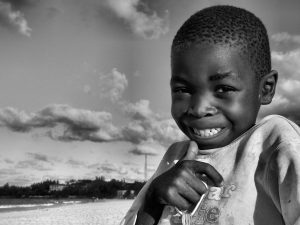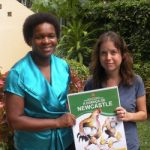 I’m walking on Maputo Beach, a beautiful, litter-strewn stretch of coastline to the north-east of Mozambique’s capital city. It’s overcast, so most of the tourists have stayed away. I am among a group of ex-pat stragglers, making their way to the ubiquitous piri piri chicken stands dotted all along the coastline.
I’m walking on Maputo Beach, a beautiful, litter-strewn stretch of coastline to the north-east of Mozambique’s capital city. It’s overcast, so most of the tourists have stayed away. I am among a group of ex-pat stragglers, making their way to the ubiquitous piri piri chicken stands dotted all along the coastline.
We feast on the chicken, sitting on plastic chairs on the beach. After we finish, a group of four children between the ages of six and ten approaches our table to ask for what is left of our meal – chicken bones. They sit in the sand next to our table, fending off their bedraggled rivals for the leftovers, and eat every single one of the bones, licking the plate when they are done. They walk up to our table and, in broken English, thank us for our bones. Then they are gone.
And that is the story of Mozambique. It’s a beautiful feast for those who can afford it; those who cannot, watch from the outside. And they wait, patiently, for the chance to scavenge from the ruins of a rich meal never meant for them.
Mozambique is a country of extreme contrast. In southern Mozambique, opulent high-rise buildings on top of the Maputo escarpment cast shadows over the people in the grimy, litter-ridden streets below.
With an unemployment rate of around 20% and with 54% of the population living under the poverty line in 2008, times are tough for people who live in the lower economic class in Mozambique. Once the poorest country in the world, Mozambique is fighting its way back up the ladder, now ranked 212 out of 226 countries by gross domestic product per capita. Large gas reserves, strong commodity exports and growing tourism are strengthening the country’s ailing economy; however, the economic upturn is slight, and many people still face a daily struggle to survive.
Children are the most obvious casualties.
Runny-nosed and dressed in threadbare T-shirts, they are dispatched to the tourist areas up the coast to sell souvenirs. Sometimes as young as five, they are militant in their pursuit of purchases. Pushing cheap curios at overweight tourists in inappropriately short shorts, they shout the only English words they appeared to know: “buy” and “twenty rand”.
The financial desperation of many locals means that they could never afford the prices demanded of tourists. And so, as in many other African countries, two parallel economies operate side-by-side: locals are charged one price, tourists another. Even the non-local fees can be subject to massive, never-explained increases. I was charged six times more for a malaria test than the price normally asked of a tourist (this included a R80 ‘translation fee’ charged by one of the janitors in a small clinic). For locals, the test is free.
This price imbalance has consequences. Disgusted by what they see as exploitative tourist pricing and resolute in their determination not to be taken advantage of, large numbers of South African tourists have taken to travelling overland through Mozambique in fully stocked and entirely self-sufficient 4x4s. As a result, South Africans are often viewed with suspicion by locals, who resent their lack of contribution to the local economy.
There is, however, a strange resonance between the two countries. Just as I was warned about the dangers of violent crime in Johannesburg by anxious Capetonians, I was warned about the dangers of walking alone in Vilanculos by anxious Scandinavians. Vilanculos is a small beach town used as a stop-off before one heads through to the island of Bazaruto. I was repeatedly warned, breathlessly, that tourist muggings had increased exponentially in recent years. I was also told locals would be hostile to my white face and terrible Portuguese.
But that couldn’t have been further from my experience.
The Vilanculos locals were unnecessarily kind to me. One man in particular, a tour operator named Venaçio, invited me to share supper with him and his fiancé at their home. Located an hour and half walk (in beach sand) from the town centre, his house was a modest two-room thatch hut that he had built from scratch. There was no furniture, only a bed. We borrowed chairs from a Polish family camping in his garden.
Venaçio’s fiancé prepared a dried fish dish with chima (pap) dipped in a coconut and peanut butter sauce, cooked on the fire in the garden. After supper, Venaçio took me out to the shebeens in his area, where we bar-hopped until dawn. The experience was far removed from the sterile, insecure glamour of Mozambique’s luxury hotels and clubs. Fuelled by rum, locals danced to Toto, Dire Straits and Mozambican rap.
I was acutely conscious of my whiteness. But it didn’t matter.
Three strangers would approach me that night and demand I buy them beer and cigarettes, but my newfound friends quickly dispatched them with expletive-laden Portuguese. From then on, I was left alone.
Venaçio had little to gain by seeking out my friendship and showing me the lived reality of his life in Vilanculos. I was travelling on a budget and could offer him little in exchange for his fish, rum and friendship. He gave them all, nonetheless.
And I was glad I met Venaçio. Towards the end of my stay in the beautiful mess that is Mozambique, I was exhausted by the conflicted irritation of being an obvious tourist in a place where cheap trinkets translate into survival. The desperation had become repulsive. And that repulsion riddled me with guilt.
Eating carefully prepared fish in Venaçio’s garden, sharing rum in a red-lit shebeen, that feeling ebbed away. I was surrounded by people who saw that I was a traveller in an environment far removed from my own, and who welcomed me into theirs, without hesitation.
Bob Marley crooned in the air around me.
I was feasting on the bones of a life far richer and more generous than my own.





Leave a Reply